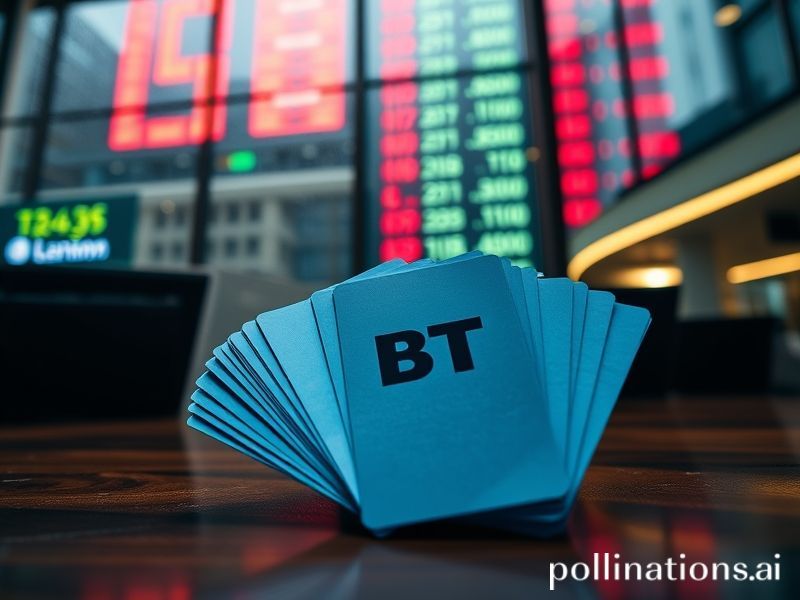BT Shares: The World’s Most Polite Rollercoaster Ride Through Submarine Cables and Pension Deficits
London – In the grand theatre of global capitalism, where every index wobble is marketed as a Shakespearean tragedy, BT Group plc’s share price is currently auditioning for the role of “tragicomic lead.” For the uninitiated, BT is the United Kingdom’s answer to the question “What if Ma Bell never died but instead put on a bowler hat, moved to Slough, and discovered fibre optics?” Its shares—ticker BT.A on the LSE, BT on the NYSE (because one continent simply wasn’t enough)—have spent the last year yo-yoing like a hedge fund manager’s conscience: up 23 % on AI-hype, down 18 % on pension deficits, up again on rumours that the French want a bite, down again when everyone remembered the French already have Orange and a functioning rail network.
Globally, the stock is a Rorschach test. In Singapore, sovereign wealth funds eye BT as a stodgy dividend mule—5 % yield, slow but reliable, like a British queue with compound interest. In Silicon Valley, VCs dismiss it as “legacy copper wrapped in red tape,” preferring to lose money on 17 competing low-Earth-orbit Wi-Fi pigeons. Meanwhile, in Beijing, policy mandarins scribble margin notes: “If we could nationalise this level of inefficiency, we’d have built three Belt-and-Road data centres by Tuesday.”
Beyond the Isles, BT matters because submarine cables matter. The company still co-owns or lands a fistful of the fibre strands that keep TikTok teens, Nigerian fintech bros, and Frankfurt algorithmic traders sharing the same cat videos at the speed of light. When BT sneezes—say, by delaying its full-fibre rollout to 2030 instead of 2025—Peruvian call-centre agents catch the cold in the form of higher wholesale bandwidth fees. Globalisation, but make it passive-aggressive.
And then there is the pension deficit, currently clocking in at a cool £7 billion, give or take whatever discount rate the actuaries pulled out of a top hat that morning. International investors have seen this film before: General Electric’s long goodbye, Deutsche Telekom’s never-ending restatements. The script writes itself: legacy telco promises nurses, posties, and linemen a gilt-edged retirement, discovers compound interest works both ways, and spends the next decade playing three-card monte with regulators. Cue BlackRock issuing a sternly worded letter, the financial world’s equivalent of a disappointed headmaster.
Yet the plot thickens—because governments everywhere are watching like anxious stage mothers. The UK can’t afford another “strategic asset” to go the way of ARM (sold to SoftBank, then Nvidia, then purgatory). Washington frets that if BT’s share price drops low enough, a Gulf sovereign fund might scoop up the keys to the trans-Atlantic cable closet. Brussels, ever the dramaturge, ponders forcing Openreach—the infrastructure arm—into a separate listing, thereby creating two underperforming equities for the price of one.
Retail investors from Manila to Manchester, lured by YouTube thumbnails screaming “BT 10-BAGGER?”, now treat the stock as a lottery ticket that also pays a quarterly coupon. The irony, of course, is that BT’s biggest existential threat isn’t Vodafone, or even Elon Musk’s next tweet, but the very fibre it is laying: once rural Britain is fully wired, the moat becomes a puddle, and pricing power evaporates faster than a minister’s promise.
Which brings us to the dividend. Management swears it is “sacrosanct,” a word executives only use right before they cut it. International bondholders, who rank senior to equity holders in the great pecking order of capitalism, have already priced in a 30 % trim. Equity analysts—professionals who put the “anal” in “analysis”—publish 200-page reports proving BT is either worth 50 p or 500 p, depending on whether they used a 9 % or 9.1 % WACC. The rest of us just watch the ticker scroll past and wonder if, somewhere in the metaverse, a digital BT share is simultaneously rising and falling, Schrödinger’s telecom.
In the end, BT shares are less a financial instrument and more a global inkblot: a copper-wrapped metaphor for late-stage infrastructure, pension arithmetic, national pride, and humanity’s stubborn belief that something which reliably underperforms the FTSE for two decades must surely be “due.” Buy, sell, or hold—just don’t forget to wave at the submarine cables on your way out. They’re the only part of the story that never bluffs.







